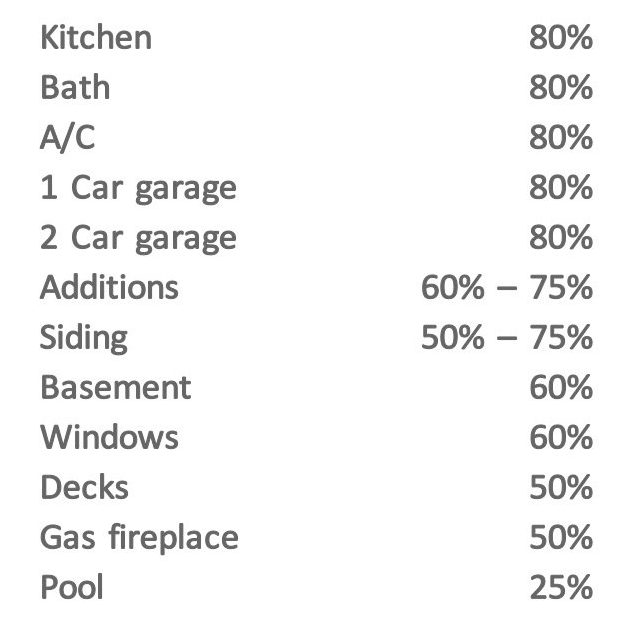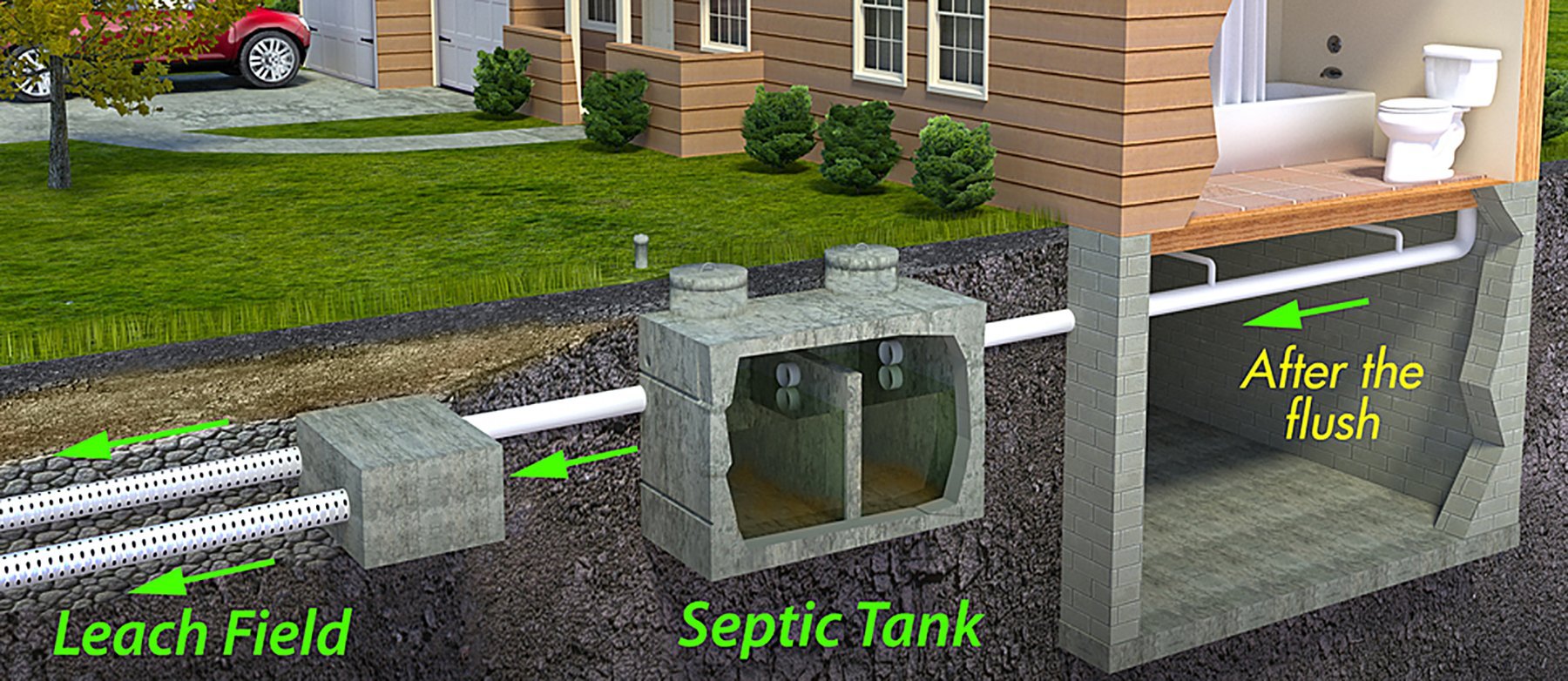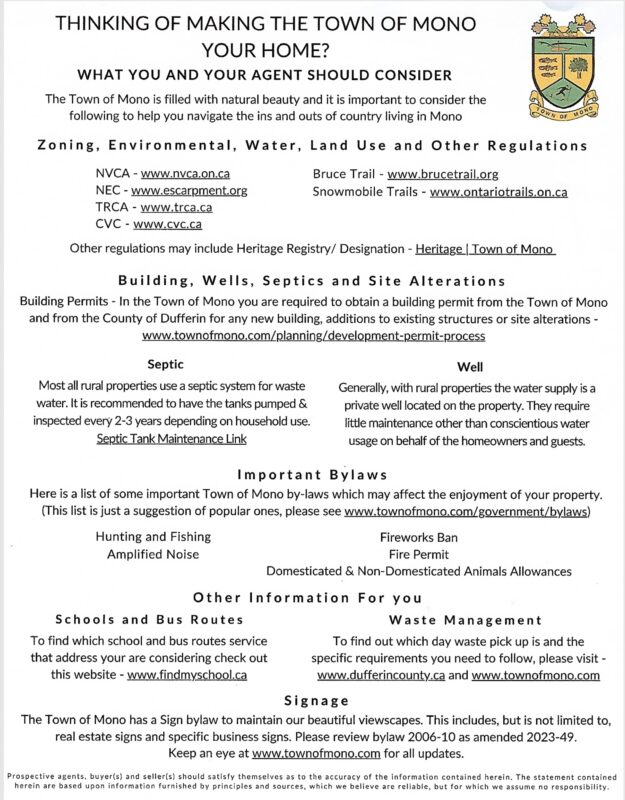Moving to the Country
Moving to the country can be an adventure many people look forward to. With more space, privacy and cleaner air, it provides the opportunity to enjoy nature, become more self-sufficient and relaxed.
If you are thinking of moving to the country, I have the knowledge and experience to help you “every step of the way”
A few things to know before you before you take that leap of faith…
Rural settings mean that things are not at your finger-tips. This could be your job, schools, rec centre, grocery store, restaurants, etc. A trip to a grocery store could be 20 minutes away. A reliable vehicle that is capable in all kinds of weather is recommended.
Garbage pickup varies in every area but is usually picked up at the end of your driveway once per week. Generally, you are limited to 1 bag of garbage and 1 bin of recyclables per week. There is a fee for additional bags.
Most country homes are on a septic system. The septic system is the responsibility of the home owner. You need to be aware of what you are putting in to your septic system. The septic tank should be pumped and inspected prior to closing and thereafter regular inspections are recommended once every 2 years and should be pumped out approximately every 3 to 4 years depending on usage. Not maintaining your septic could result in costly bills. Be aware of where your septic and weeping tile bed are located. Nothing heavy should be parked on it nor should it be driven over on a regular basis.
You will also likely be on a well. You should have an inspection prior to closing to ensure there is adequate flow and pressure. The water needs to be tested to ensure it is suitable for human consumption. If you are financing your purchase this will be a requirement of your bank. Water tests in the spring and fall are a good idea.
You probably are used to high-speed internet. Depending on your location, high-speed is not always an option. That is not to say you can’t get internet but it is likely to be a little slower and not as reliable as you are used to.
Hydro outages come with its own problems. Without hydro your pump for the well will not work. That means no running water and no flushing toilets. Note: every toilet will have one flush (water which is in the tank). If the hydro remains out for too long you should be worried about the temperature of your home and the possibility of your pipes freezing. While these types of outages are not frequent, a backup generator can be money well spent.
There are many ways to heat your home including geothermal, oil, propane and a wood
burning fireplace/stoves. You need to make arrangement with your local fuel supplier to have the tanks regularly filled so you don’t run out, especially in the dead of winter. If you have a wood burning fireplace you need to source a wood supplier or put that red plaid jacket on and chop the wood yourself. Yes, that’s country living.
Winter comes in a little stronger in the country. Heavier snowfall combined with blowing winds means it can accumulate fast. Roads can be tricky to navigate when the plows can’t keep up with the falling snow. In the winter it is best to plan ahead and have all the essentials on hand, just in case. I recommend a couple of good books.
Some properties fall within regulatory entities such as the Nottawasaga Valley Conservation Authority (NVCA) and the Niagara Escarpment Commission (NEC). This means that specified areas of your property may be classified as environmentally protected that prevents development. Be sure to discuss your plans with your realtor.
There is a certain obligation when living in the country to your neighbours, wildlife and plants. You may need to share the road with many critters including raccoons, squirrels and deer not to mention your local farmer when he/she is coming down the road in a large combine taking up ¾ of the road.
The country comes with new smells and noises. All those cute animals, horses, cows, sheep and goats smell. The farmer needs to operate machinery to get his crops on and off the field when the weather allows, meaning he/she could be operating late into the night, which can be noisy.

“I am with you every step of the way”
Preparing Your Home for the Market
“You only get one chance to make a first impression”
A small investment in time and effort can provide a big advantage when showing your home to prospective buyers.
House exterior in good repair
House number easy to see/read
Clean the eaves, troughs, downspouts & paint the soffits
Garage/carport clean and tidy
Wash windows inside & out
Door hardware in good repair
Porch clean and tidy
Consider painting the interior with neutral colours
Door knobs and cupboards latches tight
Clean all cupboards and reorganize
Furnace wiped down, cleaned and filter changed
Replace burned out light bulbs
Change filter in water softener
Consider bringing in a house cleaner
Lawns cut & raked
Hedges & shrubs trimmed
Gardens weeded & edged
Walks swept
Decks and patios swept
Snow and ice cleared
Walkways sanded or salted
Fresh flowers by front door
Home Renovations and Return on Investment
You have heard the saying, “In order to make money, you have to spend money”. One of the biggest investments we make is the purchase of a home. When selling we want the maximum return on our investment. In order to achieve this you must evaluate the asset to determine if improvements will increase its value.
Call me, I will walk through the house and point out where your money is best spent.

Sources: Canada Mortgage and Housing Corporation, and The Globe and Mail
Always think “Re-Sale”, even if you are planning on staying in the property for a number of years. Renovations can be an investment, but should be done in neutral tones and classic low-key design.
Septic Sewer Systems
With proper care but easy care, a septic tank and tile bed should last for years.

Do not allow eavestroughs to discharge near the septic tank, or surface waters to drain toward the area of the tile bed.
Keep water usage in your home to a minimum. If automatic washers and dishwashers are used, make sure you do full loads. Excessive use could flush solids from the tank to the tile bed.
Use non-toxic biodegradable cleaning products and phosphate-free or low-phosphate laundry and dish washing soaps.
The septic tank should be inspected at least once every two years and the tank pumped out when necessary. Failure to pump out a septic tank may result in sludge being carried over to the tile bed which may result in soil clogging and/or failure of the system. By the time you see ponding on your tile bed, your entire system may need to be replaced. In the middle of a drought if the grass over the tile bed is green your system may be close to failure.
Don’t park vehicles on the tile bed as the weight may crush the pipes.
Thinking of moving to the Town of Mono?
Moving to the Country
Moving to the country can be an adventure many people look forward to. With more space, privacy and cleaner air, it provides the opportunity to enjoy nature, become more self-sufficient and relaxed.
If you are thinking of moving to the country, I have the knowledge and experience to help you “every step of the way”
A few things to know before you before you take that leap of faith…
Rural settings mean that things are not at your finger-tips. This could be your job, schools, rec centre, grocery store, restaurants, etc. A trip to a grocery store could be 20 minutes away. A reliable vehicle that is capable in all kinds of weather is recommended.
Garbage pickup varies in every area but is usually picked up at the end of your driveway once per week. Generally, you are limited to 1 bag of garbage and 1 bin of recyclables per week. There is a fee for additional bags.
Most country homes are on a septic system. The septic system is the responsibility of the home owner. You need to be aware of what you are putting in to your septic system. The septic tank should be pumped and inspected prior to closing and thereafter regular inspections are recommended once every 2 years and should be pumped out approximately every 3 to 4 years depending on usage. Not maintaining your septic could result in costly bills. Be aware of where your septic and weeping tile bed are located. Nothing heavy should be parked on it nor should it be driven over on a regular basis.
You will also likely be on a well. You should have an inspection prior to closing to ensure there is adequate flow and pressure. The water needs to be tested to ensure it is suitable for human consumption. If you are financing your purchase this will be a requirement of your bank. Water tests in the spring and fall are a good idea.
You probably are used to high-speed internet. Depending on your location, high-speed is not always an option. That is not to say you can’t get internet but it is likely to be a little slower and not as reliable as you are used to.
Hydro outages come with its own problems. Without hydro your pump for the well will not work. That means no running water and no flushing toilets. Note: every toilet will have one flush (water which is in the tank). If the hydro remains out for too long you should be worried about the temperature of your home and the possibility of your pipes freezing. While these types of outages are not frequent, a backup generator can be money well spent.
There are many ways to heat your home including geothermal, oil, propane and a wood burning fireplace/stoves. You need to make arrangement with your local fuel supplier to have the tanks regularly filled so you don’t run out, especially in the dead of winter. If you have a wood burning fireplace you need to source a wood supplier or put that red plaid jacket on and chop the wood yourself. Yes, that’s country living.
Winter comes in a little stronger in the country. Heavier snowfall combined with blowing winds means it can accumulate fast. Roads can be tricky to navigate when the plows can’t keep up with the falling snow. In the winter it is best to plan ahead and have all the essentials on hand, just in case. I recommend a couple of good books.
Some properties fall within regulatory entities such as the Nottawasaga Valley Conservation Authority (NVCA) and the Niagara Escarpment Commission (NEC). This means that specified areas of your property may be classified as environmentally protected that prevents development. Be sure to discuss your plans with your realtor.
There is a certain obligation when living in the country to your neighbours, wildlife and plants. You may need to share the road with many critters including raccoons, squirrels and deer not to mention your local farmer when he/she is coming down the road in a large combine taking up ¾ of the road.
The country comes with new smells and noises. All those cute animals, horses, cows, sheep and goats smell. The farmer needs to operate machinery to get his crops on and off the field when the weather allows, meaning he/she could be operating late into the night, which can be noisy.
Moving to the Country
Moving to the country can be an adventure many people look forward to. With more space, privacy and cleaner air, it provides the opportunity to enjoy nature, become more self-sufficient and relaxed.
If you are thinking of moving to the country, I have the knowledge and experience to help you “every step of the way”
A few things to know before you before you take that leap of faith…
Rural settings mean that things are not at your finger-tips. This could be your job, schools, rec centre, grocery store, restaurants, etc. A trip to a grocery store could be 20 minutes away. A reliable vehicle that is capable in all kinds of weather is recommended.
Garbage pickup varies in every area but is usually picked up at the end of your driveway once per week. Generally, you are limited to 1 bag of garbage and 1 bin of recyclables per week. There is a fee for additional bags.
Most country homes are on a septic system. The septic system is the responsibility of the home owner. You need to be aware of what you are putting in to your septic system. The septic tank should be pumped and inspected prior to closing and thereafter regular inspections are recommended once every 2 years and should be pumped out approximately every 3 to 4 years depending on usage. Not maintaining your septic could result in costly bills. Be aware of where your septic and weeping tile bed are located. Nothing heavy should be parked on it nor should it be driven over on a regular basis.
You will also likely be on a well. You should have an inspection prior to closing to ensure there is adequate flow and pressure. The water needs to be tested to ensure it is suitable for human consumption. If you are financing your purchase this will be a requirement of your bank. Water tests in the spring and fall are a good idea.
You probably are used to high-speed internet. Depending on your location, high-speed is not always an option. That is not to say you can’t get internet but it is likely to be a little slower and not as reliable as you are used to.
Hydro outages come with its own problems. Without hydro your pump for the well will not work. That means no running water and no flushing toilets. Note: every toilet will have one flush (water which is in the tank). If the hydro remains out for too long you should be worried about the temperature of your home and the possibility of your pipes freezing. While these types of outages are not frequent, a backup generator can be money well spent.
There are many ways to heat your home including geothermal, oil, propane and a wood burning fireplace/stoves. You need to make arrangement with your local fuel supplier to have the tanks regularly filled so you don’t run out, especially in the dead of winter. If you have a wood burning fireplace you need to source a wood supplier or put that red plaid jacket on and chop the wood yourself. Yes, that’s country living.
Winter comes in a little stronger in the country. Heavier snowfall combined with blowing winds means it can accumulate fast. Roads can be tricky to navigate when the plows can’t keep up with the falling snow. In the winter it is best to plan ahead and have all the essentials on hand, just in case. I recommend a couple of good books.
Some properties fall within regulatory entities such as the Nottawasaga Valley Conservation Authority (NVCA) and the Niagara Escarpment Commission (NEC). This means that specified areas of your property may be classified as environmentally protected that prevents development. Be sure to discuss your plans with your realtor.
There is a certain obligation when living in the country to your neighbours, wildlife and plants. You may need to share the road with many critters including raccoons, squirrels and deer not to mention your local farmer when he/she is coming down the road in a large combine taking up ¾ of the road.
The country comes with new smells and noises. All those cute animals, horses, cows, sheep and goats smell. The farmer needs to operate machinery to get his crops on and off the field when the weather allows, meaning he/she could be operating late into the night, which can be noisy.
Preparing Your Home for the Market
“You only get one chance to make a first impression”
A small investment in time and effort can provide a big advantage when showing your home to prospective buyers.
House exterior in good repair
House number easy to see/read
Clean the eaves, troughs, downspouts & paint the soffits
Garage/carport clean and tidy
Wash windows inside & out
Door hardware in good repair
Porch clean and tidy
Consider painting the interior with neutral colours
Door knobs and cupboards latches tight
Clean all cupboards and reorganize
Furnace wiped down, cleaned and filter changed
Replace burned out light bulbs
Change filter in water softener
Consider bringing in a house cleaner
Lawns cut & raked
Hedges & shrubs trimmed
Gardens weeded & edged
Walks swept
Decks and patios swept
Snow and ice cleared
Walkways sanded or salted
Fresh flowers by front door
Home Renovations and Return on Investment
You have heard the saying, “In order to make money, you have to spend money”. One of the biggest investments we make is the purchase of a home. When selling we want the maximum return on our investment. In order to achieve this you must evaluate the asset to determine if improvements will increase its value.
Call me, I will walk through the house and point out where your money is best spent.

Sources: Canada Mortgage and Housing Corporation, and The Globe and Mail
Always think “Re-Sale”, even if you are planning on staying in the property for a number of years. Renovations can be an investment, but should be done in neutral tones and classic low-key design.
Septic Sewer Systems
With proper care but easy care, a septic tank and tile bed should last for years.

Do not allow eavestroughs to discharge near the septic tank, or surface waters to drain toward the area of the tile bed.
Keep water usage in your home to a minimum. If automatic washers and dishwashers are used, make sure you do full loads. Excessive use could flush solids from the tank to the tile bed.
Use non-toxic biodegradable cleaning products and phosphate-free or low-phosphate laundry and dish washing soaps.
The septic tank should be inspected at least once every two years and the tank pumped out when necessary. Failure to pump out a septic tank may result in sludge being carried over to the tile bed which may result in soil clogging and/or failure of the system. By the time you see ponding on your tile bed, your entire system may need to be replaced. In the middle of a drought if the grass over the tile bed is green your system may be close to failure.
Don’t park vehicles on the tile bed as the weight may crush the pipes.


